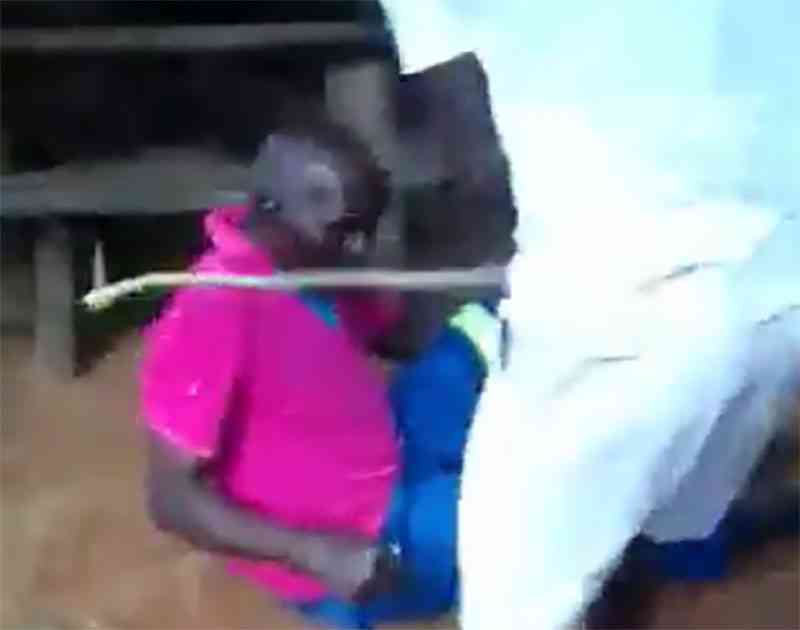
On March 3, 1991, a private citizen, using his cell phone, videoed the beating of Rodney King, a black man by 13 Los Angeles policemen.
Apart from its sickening effect was the lack of moral courage among the 13 policemen. None among them, even the sergeant, attempted to stop the beating.
The beating up of elderly people in Murewa by Zanu PF thugs was broadcast through YouTube videos all over the world. The beating of VaKarahwa, with seven-foot two-inch thick Mitambara was watched by more than 10 people.
The female Philistine who led the trial by torture of VaKarahwa forgot the sanctity of old age. None of the witnesses, as in Rodney King’s story had the moral courage to challenge the evil deed.
The Philistine self-videoed her activities, hoping for a medal.
Apparently, according to Zimbabwean Amanda Hammar, this violence is part of larger pattern of “mass physical removals in both urban and rural areas, and broader dislocating effects of structural violence, formal and informal” fulfilling the overall policy of maintaining political power. (p 79)
In the Philistine world virtue is a dirty word. Experience does not wizen today’s steps. What South African leader Thabo Mbeki was saying in his “I am an African” speech is that the blood of these primitive Murewa VaKarahwa runs in our veins. To disrespect them is to reveal deep self-hatred.
Exposure
- Mavhunga puts DeMbare into Chibuku quarterfinals
- Bulls to charge into Zimbabwe gold stocks
- Ndiraya concerned as goals dry up
- Letters: How solar power is transforming African farms
Keep Reading
The advent of the cellphone, YouTube and the email means that governments have no privacy anymore.
There is a difference between hearing about Zanu PF beatings and seeing them on YouTube. This exposes the government to moral hazards. Government spokesperson Nick Mangwana may deny that the Murewa malefactors are affiliated to Zanu PF but an answer by citizens who saw a video of August Gutu Zanu PF youth marching through the streets shirtless and beating whoever crossed their path will keep his wisdom to himself.
The London Guardian (January 5) broadcasts the fact that opposition member Job Sikhala has been refused bail for the 15th time.
A sense of double standards cannot escape the reader’s sense of fair play.
Judge Marehwanazvo Gofa wisely refused a televised trial because the government would be placed at a serious disadvantage. Gofa could have refused the request without giving a reason. By arguing that Sikhala, a legislator, who has served 240 days in a “stupid jailhouse” (black English) before a judge has pronounced him guilty of anything, exposes the learned judge to the accusation of political bias.
Worse the judge can be accused of lack of moral courage, a cruel suggestion because moral courage lies at the heart of a judgeship.
On October 20, 2020, Henrietta Rushwaya was apprehended at Harare Airport with six kilograms of gold on her way to Dubai.
Henrietta is free, two years after the event and no court has yet finalised her infraction.
The case of two white sugar farmers, Shane and Denise Warth brings a different dimension to the issue of what Amanda, above, referred to as displacements. Zanu PF activist Brother Emmanuel Chiguba was harvesting the sugar crop with permission from a judge.
This story is on Voice of America (January 6). Zimbabwe wants US President Joe Biden to lift sanctions. In any case, not all white people are evil minded. There is plenty of virgin land open in the Triangle area.
Verily, I say to you, we are ruled by imbeciles who regard moral courage as a curse.
In defense of bandit businessmen
As we speak, three haulage trucks belonging to Bernard Tafadzwa Mnangagwa (December 31) carrying raw lithium were intercepted at Beitbridge Border Post. At the time of going to press, Brother Bernard remained a free man as it should be until a judge pronounces him guilty.
A reading of Adam Smith’s Wealth of Nations gives us an explanation. Zimbabwe businessmen, including bandit businessmen, are faced with dealing in two currencies, a fake Zee dollar printed by John Mangudya in the basement of the Reserve Bank.
The other is the US dollar, which is as good as gold.
Even the Makorokoza (independent gold digger) would rather sell his product to Mustafa (an Asian king pin) who pays him in US dollars rather than to the Zimbabwe Minerals Board. It is also a law of nature that monies accumulated in such ways cannot be banked.
Why is this so difficult to understand, you sluggard?
New York’s Bloomberg News (January 9) reports that Zimbabwe’s treasury officials are begging contractors whom they have paid with stupid Zee dollars not to part with them. Bloomberg adds (para 3) that the Zee dollar has lost almost one tenth of its value in one week.
But this must be the mother of all jokes. I am reliably informed by a member of a parliamentary committee that at the end of the moth, the treasury officials do not take home the Zee dollar.
Let the reader be the judge. Verily, I say moral courage has fled from the hearts of our leaders.
The problems at the Grain Marketing Board and at the Cotton Board shows how public policy since independence was intended to create a bandit economy.
Noah Muzorori’s book, Zimbabwe’s Grain Marketing Board says that its aim and practice was to get the highest price for its farmers. If the Board sold its product at a higher price on the world market, it would make a supplementary payment to the farmers in January.
Professor David Blackie concurs in his 1980 report on the Cotton Board. Blackie says that these boards were the envy of the world.
The brothers turned the boards around, creating a haven for bandits whose aim is to scheme the difference between the offering price (government price) and the world price.
- Ken Mufuka is a Zimbabwean patriot. He writes from the US.









